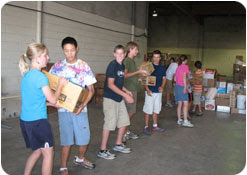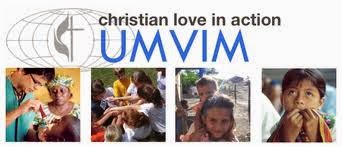
Photo: Youth from Bozeman Montana unload gifts of health kit supplies at UMCOR West. courtesy of Yellowstone Annual Conference. Read more below.....
*YELLOWSTONE CONFERENCE GIVES TO UMCOR DEPOT WEST
The Yellowstone Conference collected thousands of health kit contents at their annual conference in June. They received nearly 400 cubic feet of supplies and the youth mission team from Bozeman, Montana personally delivered them to UMCOR West in Salt Lake City, Utah.
They helped assemble kits at UMCOR West and painted the warehouse. Says Sally McConnell who coordinated the mission, “By collecting the supplies and working at the depot we made a difference and were sharing the love of Christ with persons in need whom we will never meet.”
Donating kit supplies or financial gifts to purchase the supplies, makes a direct and tangible difference in sustaining people's lives.
Donating kit supplies or financial gifts to purchase the supplies, makes a direct and tangible difference in sustaining people's lives.
The types of kits UMCOR West is collecting include: health, sewing, school, layette, bedding and cleaning buckets in addition to the new birthing kit. Detailed information about assembling kits can be found here. You can give toward the purchase of supplies instead of buying and shipping them. Please consider giving to Material Resource Ministry, UMCOR Advance #901440.
* TEAM GOING TO NICARAGUA IN FEB 2010 IN NEED OF MEDICAL PROVIDER VOLUNTEERS
A mission team from Bloomington, IL that goes to Nicaragua in Feb. 2010 is in need of providers ( Dr., PA, NP) As of today they only have two providers that are signed up to go. Last year they had six and were able to see about 1700 patients. If anybody is interested they can contact Kristie Gamble and she will put you in touch with the team leader. You can contact Krisite at 270-885-4365 home or 270-498-6296 cell.
* UMCOR CASE MANAGEMENT TRAINING IN THE PACIFIC NORTHWEST CONFERENCE
This two-day training prepares disaster case managers to support disaster survivors as they make their way through the recovery process. The training is being delivered by nationally recognized trainers and provided by the Citizen Corps Council of Pierce County in cooperation with the Pierce County Department of Emergency Management.
Training includes Case management skills, building trust with clients, confidentiality, privacy, and cultural diversity. Unique needs of disaster case management including developing individual recovery plans and accessing federal aid for clients.
Helping disaster survivors cope with change. Attendees: Disaster Survivors Advocacy Team (DSAT) members, potential disaster case managers and partners to the DSAT team.
Helping disaster survivors cope with change. Attendees: Disaster Survivors Advocacy Team (DSAT) members, potential disaster case managers and partners to the DSAT team.
Date: Wednesday, Oct 7 and Thursday, Oct. 8
No cost; funded by a Homeland Security grant.
Time: 08:30 AM —4:30 PM
Lunch is provided—see instructions on attached lunch order sheet
No cost; funded by a Homeland Security grant.
Time: 08:30 AM —4:30 PM
Lunch is provided—see instructions on attached lunch order sheet
Location: Oct. 7 will be at 9850 64th St. W. University Place, 98467
Pierce County Environmental Services Building
Oct. 8 will be at 2501 S. 35th St., Tacoma, 98409
Tacoma/Pierce County Emergency Operations Center
Pierce County Environmental Services Building
Oct. 8 will be at 2501 S. 35th St., Tacoma, 98409
Tacoma/Pierce County Emergency Operations Center
To Register: Pierce County participants have priority until Sept 25, 2009 to register by sending an e-mail to PCDEMTraining@co.pierce.wa.us with your name, e-mail address, and organization affiliation.
Out-of-county partners may register at any time and will be notified after Sept. 25 if seats are still available for participation.
Questions? Contact Barbara Nelson, Pierce County Citizen Corps Liaison, bnelso1@co.pierce.wa.us or 253-798-2168 or Paul Shukovsky, Pierce County Emergency Management, pshukov@co.pierce.wa.us or 253-798-2219.
* REAL DISASTER RESPONSE - SERVANTS FOR THE MINISTRY: BY TOM HAZELWOOD, ASSISTANT GENERAL SECRETARY, UMCOR
In the recent Batman Dark Knight movie there is a scene where the Joker uses a quip we have all heard many times, he says, “I'm like a dog chasing cars. I wouldn't know what to do with one if I caught one.” To some extent, I feel like that is analogous to the situation we find ourselves in today in U.S. Disaster Response.
For years, we in the voluntary sector and especially the faith-based disaster response organizations have chased after government dollars to help pay for the work that we do as partners in disaster mitigation, response, and recovery.In the four years following Hurricane Katrina, we finally got some of what we have been chasing. What have we caught? The U.S. Government now funds a variety of programs that are intended to help the disaster survivor following disasters. Whether the money comes from the Federal Emergency Management Agency (FEMA), the Department of Health and Human Services (DHHS) or some other source, it has created a dilemma for the faith community.
At UMCOR, we are clear that our mission and ministry are to provide humanitarian assistance “without regard” to a person’s status. Yet, if we as an organization decide to receive money to implement one of the programs being funded by the government, we suddenly have to abide by the parameters that are set by the government as to who can be served. Therein lies the problem. Do we accept money from the government and the inherent restrictions and reporting mechanisms that go with it? Or do we simply ignore the opportunity for government funds and just stick with doing what we can with the funds that are donated by those who support the ministry of UMCOR?What are the options?
Okay, so one solution would be for UMCOR to expand its current non-governmental program, which works internationally, to include a domestic program. Thus UMCOR would create parallel programs, one that uses our private donor funds and one that is funded by the government. Oh, except there is a problem with that model. UMCOR believes fundamentally that all disasters are local. Therefore, the actual implementing of ministry programming (the REAL response and recovery) takes place at the annual conference and community level.
Well then, UMCOR could implement government-funded programs locally, and we could simply continue to provide the private United Methodist funding to annual conferences so they can implement their own response and recovery as they have in the past. We actually tried something similar to this approach after Hurricane Katrina when UMCOR created Katrina Aid Today (KAT) with a grant from FEMA, and while KAT itself was a very successful project, and the annual conference response and recovery, which is still ongoing today, was/is also successful, it did not make for good relationships between UMCOR and our annual conferences. There was always tension between the goals of the government-sponsored program and the UMC funded program. It felt like we were competing with ourselves.
Today, it appears that most government funding for response and recovery is going to be channeled through the states. What this means practically is that any application for government funds will have to be made by the annual conference. I openly ask the question, how many of our annual conferences have both the capacity and the desire and willingness to create parallel operations for disaster response and recovery if they have a disaster? My assessment is: “Not many.”All this brings me back to my first metaphor. We, like the dog, have chased down the proverbial car.
Now what?I think we must remember who we are. We are called to be ministers for Jesus Christ. And for UMCOR, as a part of the general agency of the UMC called to serve Global Ministries, we have the charge to equip willing servants for the ministry of disaster response. I think we have to choose. Do we want to enable the ministry of the church, enable volunteers to participate in risk-taking mission and service, or do we want to implement government programs?
Now don’t get me wrong here, I fully understand that BOTH are means of helping those who have survived disaster move toward wholeness and the new normal that comes following disaster. BOTH are well intentioned and serve a great purpose. But having observed UMCOR oversee one government grant I believe UMCOR’s place is to be the enabler of ministry. Like the pooch that chased down the car and got hit by the tire, I think it is better to stay home and be the friend and companion to our annual conferences and not chase cars any more. But perhaps you have an even better idea we have not considered.
Send us a line. Let us know what you think! http://media.gbgm-umc.org/umcorblog
Tom Hazelwood
Assistant General Secretary
UMCOR Disaster Response U.S., Caribbean, Latin America
100 Maryland Ave. NE Suite 315
Washington, DC 20002
Phone: 202.548.4002
Fax: 202.544.4116
Cell: 703.624.3224
http://www.umcor.org/
Tom Hazelwood
Assistant General Secretary
UMCOR Disaster Response U.S., Caribbean, Latin America
100 Maryland Ave. NE Suite 315
Washington, DC 20002
Phone: 202.548.4002
Fax: 202.544.4116
Cell: 703.624.3224
http://www.umcor.org/
* NEEDS IN THE PHILIPPINES IN THE WAKE OF TWO TYPHOONS
UMCOR Philippines is at work in Botolan after two typhoons hit the area. According to Ciony Eduarte who manages UMCOR’s office in the Philippines, people have been relocated to safer areas as flash flooding resulting from a damaged dam and overfilled rice fields continue to create hazardous conditions.
UMCOR is assisting with emergency response, distributing food in the affected areas in coordination with the district superintendent and KKFI,. They are working together to develop a plan for a longer term response as the needs are assessed.
Your gift to UMCOR Philippines will help those affected by the most recent typhoons. Please give to Philippines Emergency, UMCOR Advance #240235.
Your gift to UMCOR Philippines will help those affected by the most recent typhoons. Please give to Philippines Emergency, UMCOR Advance #240235.
